Radio needs creative and natural storytellers, says German radio journalist, reporter and presenter Sandra Müller. “This stupid format radio has just wiped out everything.”
If radio needs an ambassador, I vote for Sandra Müller. Her presentation at the Tutzinger Radiotage was full of enthusiasm and showed a great passion for radio. That’s what this blog is all about! So I’ve asked her for an interview. Bürokratendeutsch and repressing formats are not her cup of tea, but she loves reality reporting and soundscapes.
Ears for radio & music
Sandra started early: she already played radio with her school friends. “I was the presenter and we played songs. We even had commercials that we acted live.” She always has been very auditory: “I can read things a thousand times and don’t remember them, but I learn extremely fast when someone explains things verbally. I’m also into voices. When people don’t have a pleasant voice, we have a problem getting along, hahaha. But I have thick glasses and I don’t see well. Maybe that’s why nature blessed me with good ears and a passion for radio and music?”
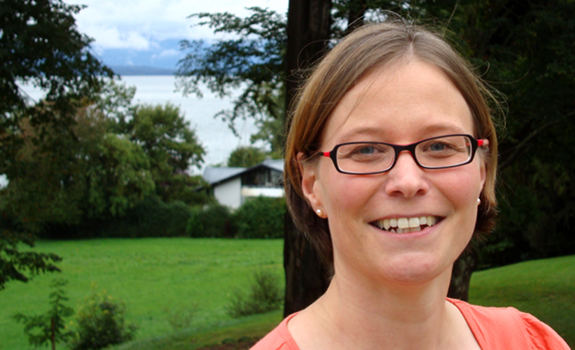
Radio journalist Sandra Müller: “I like to jump with my microphone right into the situation” (photo: Thomas Giger)
Real life sound bites
“I produce features with a lot of atmosphere. I rather use sound bites directly from life, instead of recording desk-quotes where you sit down with people in their office. I like to jump with my microphone right into the situation and eavesdrop on life. It’s funny that just listening to people and situations carries more emotion than seeing images.” However, a combination of audio and visual does work for radio, especially online. Sandra experiments with audio slideshows to make radio features visually attractive on the Internet.
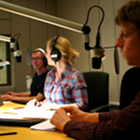 Which radio stations, programs and talents inspire you?
Which radio stations, programs and talents inspire you?
“I’m a DRadio Wissen fan because of their unpretentious approach. They have young radio personalities who dare to speak very natural. As a language loving person I find it regrettable that so many radio people seem to be infected by Bürokratendeutsch (politically very correct, diplomatic language). News and features often sound authoritative and official. Radio presenters and reporters should get rid of it and just talk like they normally do.”
Educational content & musical variety
Sandra likes that DRadio Wissen “news includes topics which are not urgent, but interesting. They often do take time for one extra sentence that makes people understand things that they often didn’t elsewhere. When it comes to music radio, I enjoy listening to American jazz stations from New Orleans – both me and my husband are jazz fans. I also like initiatives such as Byte FM. The station plays music that I don’t hear anywhere else and they have variety: an hour of rock, followed by an hour of jazz, and so on.”
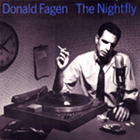 The law of formatics says that radio isn’t supposed to be done like this.
The law of formatics says that radio isn’t supposed to be done like this.
“I can imagine that you have to do it when you depend on commercials. But as a listener I find it very unpleasant. There’s almost nothing else out there, while especially at night you could play less usual music. People really listen and make a connection with their radio host. ‘Others are sleeping, but the both of us are still awake’ is the mutual feeling. Night time could be a chance for engaging music programs.”
Lack of interesting personalities
Sandra Müller also enjoys good interviews. She mentions her colleague Chrissie Weiss of Radio 7, winner of Der Deutsche Radiopreis (The German Radioaward) for the best interview of 2011. Weiss had a remarkable conversation with a man who has been a woman. “It was a sympathetic, authentic and friendly interview as you don’t hear it often. It’s a shame that there’s no real talk radio in Germany. Why doesn’t radio use more of these interesting personalities who tell great stories and let them do it? I think that’s a bit sad.”
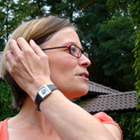 Are there many personalities in German radio at all?
Are there many personalities in German radio at all?
She laughs and says after a short silence: “Yes, that is the right question. And I think the answer is no.”
Why is that?
Sandra sighs. “This stupid format radio has wiped out everything.”
Excessive formatics kill creativity
“Fifteen years ago I visited a station that was completely controlled by radio automation. The presenter was given 20 seconds of airtime after which his microphone was being muted automatically. He was so pressed into the format without being able to decide anything himself; he just had to fill the gap! Horrifying. It kills personality and takes radio’s soul. Some stations still determine in an ice cold way: you can only use these exact wordings and phrases. It’s hard to develop personality when all freedom is curtailed immediately.”
Top 3 radio do’s
These are the 3 main tips for young radio people according to Sandra Müller:
1. Listen: “Listen to the radio, have fun with it, and open your ears.”
2. Personalize: “Get close to the topic and people. Don’t be the official, serious radio reporter always. A reporter should first of all be a human being who likes good stories and engaging conversations. Good small talkers are good radio people.”
3. Experience: “In the early days you had to wait until you were employed at a station. Today, there are no excuses anymore. Everyone can broadcast from anywhere, using podcasts and web streams. So do it – gain experience; make radio.”
We’re often alone in the studio and talk to a wall. If we’re lucky, there is a window and if we’re really lucky, we see people out there that we can talk to. What do you do to reach the listener?
“I always have someone in my mind. I go to events that my audience visits, to learn what kind of people the listeners are. Especially at local stations, some presenters unfortunately do not have a high regard of their audience. I love my listeners and I like spending time with them, even if I work for a station that’s heard by 60-year old people who didn’t finish high school and live in a village. They’re almost the opposite of what defines my own surroundings. But I’m fascinated by their life experience and passion for what they do.”
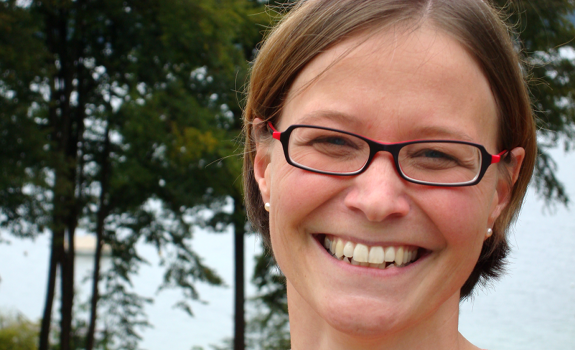
Sandra Müller: “When I’m on the air, it looks like I’m talking to an imaginary, invisible friend” (photo: Thomas Giger)
Be yourself on-air
“Inside the studio I don’t necessarily think of an existing person, more of this particular type of human. I have conversations with him and I don’t talk different than in normal life. I do move around a lot and I make all kinds of gestures while I’m speaking. When people see me presenting, they sometimes laugh because when I’m on the air, it looks like I’m talking to an imaginary, invisible friend, hahaha.”
Also read part 2: Radio’s Credibility And Relevance At Stake?

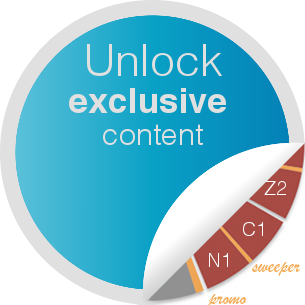



Thank you, Ephraim, for your kind words! Glad we could help you!
Thank you for this talent coaching. I learnt a lot of different aspects that would enormously improve my presentation skills. Keep this good work up!
I really love this. It encourages me.
I am Adebisi Sulaimon, a final year student of Lagos State University in Lagos, Nigeria. In partial fulfilment of the award of my BSC degree, I choose to write a project on Presentation on Radio.
I will really appreciate if you can send me some materials to guide my writing. My topic is: challenges of radio presentation; a study of selected presenters.
I’m looking forward to reading your reply.
Adebisi
I’ll soon retire from a public radio station, but soon to establish a private station. We’ve applied for a license waiting for approval.
By going through your publications on Radio I Love It, I’m now well armed to compete with any station within my region. I thank you very much.
Musa Waziri
I’m a 20 year-old lad from Uganda who finds radio to be fun, interesting and dynamic. Here in Kampala, radio is becoming bigger and better.
This article is brilliant, and l hope to apply this on my quest for a radio career.
Thanks for the guidance.
Hi Meck,
Thanks for your friendly words! I’m glad that you enjoy the site and find it useful as well.
Of course, it’ll be a pleasure to help you with your training. Could you tell me a bit more about your station’s program format, music style, target audience, and so on? Because this will determine how, for example, your tone of voice on air or your music rotation will be.
But I’m happy to send you some details on the universal basics of radio (that apply to basically any market and format).
Best regards,
Thomas
Can’t agree with you more. This website to me is the radio bible, I love it!
I am just about to carry out training for my radio presenters in Lusaka, Zambia.
Any way that you can help me with some Powerpoint presentations on programming, music, and presentation?
Hi Thomas,
“What’s hot in your radio market right now?”
The shortest answer could be: “It’s pretty cold”, but its requires a very detailed response, despite that I’ll try to be short. The main problem in Croatia is that radio knowledge = 0, but BMC (the company I work for) in the next few years will try to change the score.
In the past 25 years, nothing has changed on the radio in Croatia. There is only one good radio project, Antena Zagreb. They got know-how from abroad, from people that know radio and that’s why are they so successful. BMC in the past few years collected knowledge, and still does, from radio people all over the world and hopes to be able to implement that knowledge to radio people in Croatia. Maybe one day you’ll write something about us on Radio))) ILOVEIT :-)).
P.S. For this Summer vacation, I recommend Croatia. We don’t have such a good radio market (yet), but we have the most beautiful coast on Earth.
Regards from Croatia,
Darijo
Hi Darijo,
First of all, sorry for my late reply. It’s been really busy! Thanks for your comment, and I think I basically agree with you. A well thought-out and properly executed radio format still could (and always should) leave enough space for creativity.
I think one of the biggest challenges for program directors is finding the optimal balance between creating a consistent radio station (thus high audience loyalty) and granting their personalities enough freedom to express themselves.
Thank you for your compliments, and cool to hear from Croatia! What’s hot in your radio market right now?
Best regards from Holland,
Thomas
I agree with almost everything Sandra said, she has a very good perspective on how talents or DJs should be. Everything she said is so right and I’d rather like to see her as talent coach. But there is one thing that I do not agree with: ‘formatics kill creativity’.
Of course, it’s not right to mute a mic after 20 seconds, but I think that in 1 minute or 1,5 minutes of talent performance and personality like Sandra said, talent can be creative a lot. Nowadays, every radio station that depends on commercial needs to have some kind of format, just to know who are they talking to – because they can’t talk to everyone.
It’s meant to sort a program and avoid a mess, and it’s not killing creativity… it’s more about strategy and positioning.
P.S. Just discovered this web site and it’s great :-)
Best regards from Croatia,
Darijo
Hi Teddy,
Thanks for your comment, nice to hear from you!
I have always loved radio’s 1-on-1 connection to the listener, too. It’s probably what makes radio still unique in this competitive media environment. I’m convinced that radio will remain to be relevant, if station owners keep investing in what may be the most important part of radio: great talent – radio personalities that listeners can relate to.
Thanks again!
Best regards,
Thomas
Nice one. I’m a presenter with one of Nigeria’s biggest media houses (Star FM 101.5 & TV). For radio, just imagine you are talking to one person and that person must feel you enjoy. You get them to want you not to leave if your time on-air is up.
You must be up to date about info, let every word you say be spiced with something fresh and you will be come hot. It has worked for me.
Nice word, keep it up.
Teddy Don-Momoh